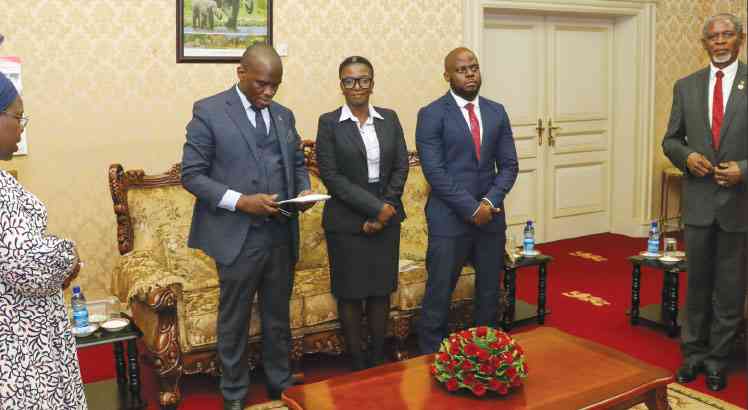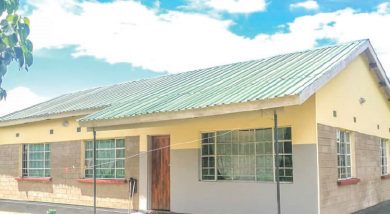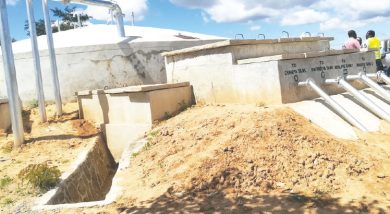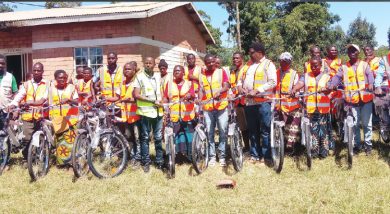Fresh resolve to fight graft
Following President Lazarus Chakwera’s Wednesday meeting with key officials in the battle against corruption, the Attorney General (AG) and the Director of Public Prosecutions (DPP) yesterday said the summit signals a reset in Malawi’s graft fight.
Besides the President and Chizuma, the meeting at Kamuzu Palace in Lilongwe was also attended by Secretary to the President and Cabinet Colleen Zamba, Minister of Justice Titus Mvalo, AG Thabo Chakaka Nyirenda and DPP Masauko Chamkakala.
It followed the appointment of Chamkakala, formerly head of the Malawi Legal Aid Bureau, as DPP to replace Steven Kayuni who had a strained relationship with Chizuma which allegedly affected prosecution of some corruption cases.
Nyirenda and Chamkakala, in separate interviews yesterday, expressed hope that the inter-agency meeting will strengthen the relationship among law enforcement agencies. The duo said they believed the meeting could signal a fresh start in the fight against corruption.
And in a Facebook post after the meeting, the President said the “cordial engagement” among the agencies cemented his administration’s resolve to deal with corruption with a seamless approach that bears fruit.

and Mvalo at the meeting
Chamkakala said the President assured the agencies of government’s commitment to support all local enforcement agencies to ensure fulfillment of their mandates.
He said Chakwera encouraged the offices to work as a united team in the fight against criminality.
Said the DPP: “It is a start of what ought to be a fresh start, could well have been before. On our end, we will be enhancing different other areas of collaboration hence being a new way of doing things.”
On his part, Nyirenda described the efforts to consolidate the fight against corruption as a renewed hope in the fight against graft in the country.
In an earlier interview with The Nation on Monday this week, the AG asked State law enforcement agencies to coordinate if the rule of law is to flourish and enable the country to win the fight against corruption.
But Chizuma, on the other hand, declined to comment on the meeting and the impression she got, saying State House was better-placed to do so.
Presidential press secretary Anthony Kasunda referred this paper to Mvalo who did not respond to our inquiry.
However, South Africa-based Malawian law professor Danwood Chirwa has described the meeting as a sham, saying: “There’s no doubt that such a meeting is a mere sham, a meaningless public relations exercise aimed to repair a long tattered appearance of seriousness about corruption. Behind the curtain of pretence lies betrayal, vendetta and mala fides.”
Youth and Society executive director Charles Kajoloweka commended Chakwera for the steps taken, but cautioned that the inter-agency coordination should not compromise the integrity or mandate of each law enforcement agency.
He said the coordination should also not be at the expense of the independence of the agencies.
Said Kajoloweka: “There is need to strike a balance when strengthening the inter- agency coordination. We should not compromise the independence and integrity of the individual institutions. Each agency is accountable on its mandate bestowed on it.”
On his part, National Anti- Corruption Alliance chairperson Moses Mkandawire hailed the move, saying the mistrust and lack of respect between the agencies, to a large extent negatively affected the collaboration, coordination and networking mechanisms, adding that the net effect was the slow momentum in the fight against serious and organised corruption in the country.
University of Malawi political analyst Professor Mustafa Hussein also welcomed the efforts as commendable.
“It is important that these institutions are on the same page, especially when it comes to fighting corruption. Such coordination by the President is necessary and a sign of good leadership,” he said.
Strained relations between the ACB and the DPP offices came to the fore after the bureau publicly accused the DPP’s office of withholding consent to prosecute cases on concluded investigations.
At one point, Mvalo, on instructions from the President, brought to a roundtable Nyirenda, Kayuni and Chizuma to help them resolve the purported differences.
The former DPP also at one point accused the bureau of acting in isolation which one time led to the arrest of suspects that were supposed to be State witnesses in a particular case.
On the other hand, Malawi Law Society (MLS) said the fight against corruption is half-hearted and it has put it on an agenda for discussion at its annual general meeting to take place in Mangochi from March 24 to 26 this year.
In a bid to clear the ambiguities, Parliament amended the Corrupt Practices Act to remove the requirement for the ACB to seek consent from the DPP to prosecute cases.





